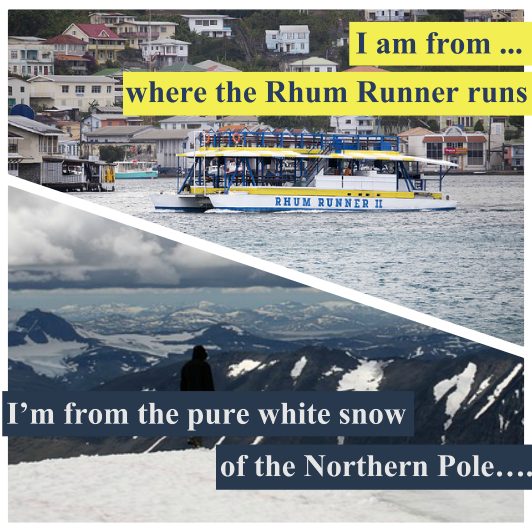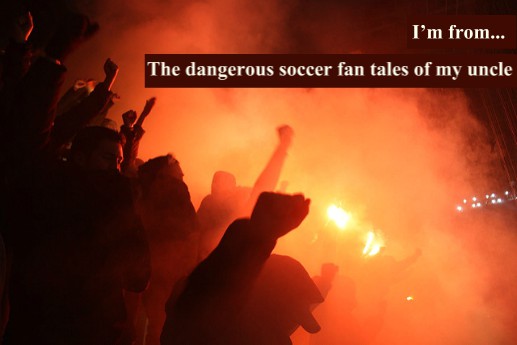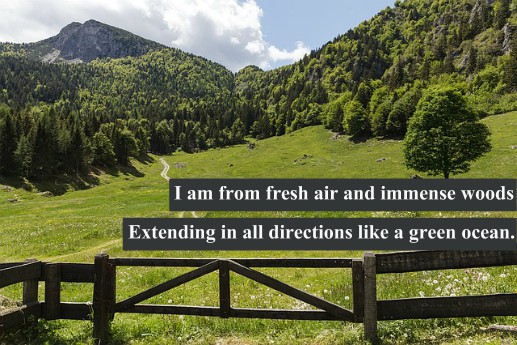
Transitions enthusiast H.E. Rybol is back with her final post of 2016.
Happy holidays, Displaced Nationers!
Are you already thinking about trips you’d like to make in 2017? Maybe you’re thinking about climbing Mount Kilimanjaro? In which case you’ll find it inspirational to meet Eva Melusine (Sine) Thieme, traveler, writer, and author of the hilarious memoir Kilimanjaro Diaries: Or, How I Spent a Week Dreaming of Toilets, Drinking Crappy Water, and Making Bad Jokes While Having the Time of My Life, about climbing Africa’s highest mountain with her teenage son.
Born in Germany, Sine—whose name is not pronounced like “mine”—has moved across the world seven times, “lugging progressively more stuff and family members along the way,” as she puts it on her author site. Most recently, she and her husband, also German (they met in Stuttgart), spent three years in Johannesburg, South Africa, with their four children.
At that time, Sine started up her popular blog, Joburg Expat, as a space for recording her adventures—ranging from her campaign to help baseball gain a foothold in an African township to a series of hair-raising encounters with lions, great white sharks, and the Johannesburg traffic police.
The family now lives in Tennessee, where Sine continues to maintain her Jo-burg blog. She also writes freelance for the Wall Street Journal and other outlets, and prides herself on remaining sane with four teenagers in the house—which reminds me of a quote by Nora Ephron:
“When your children are teenagers, it’s important to have a dog so that someone in the house is happy to see you.”
Sine says her next book will be about a road trip through Namibia with six people in a five-person car.
She kindly took time out from her busy life to share some of her culture shock experiences. Join us as we talk about mustaches vs. mustard, cultural differences in parenting—and the therapeutic benefits of writing…
* * *
Welcome, Sine, to Culture Shock Toolbox. So where on our beautiful planet have you lived?
I was born in Germany where I spent the first 16 years of my life. I then embarked upon a year as an exchange student in the United States, arriving full of wonder in the Deepest South of Mississippi, marveling at such novelties (to me) as cordless phones, giant TV screens and drive-through fast food. My love for America kindled and confirmed, I returned after my undergraduate studies for an MBA at the University of North Carolina together with my also German-born husband. We have since moved—with an ever-growing entourage of kids—to Singapore, Wisconsin, Kansas, South Africa, and now Tennessee. Having been naturalized in 2010, I don’t consider myself an expat in the United States any more. My most memorable time of feeling like an expat came when we lived in Johannesburg with our four children, from 2010 to 2013.
It sounds like a beautiful love story, what you said about the United States! In the context of your many cultural transitions, did you ever put your foot in your mouth?
The most embarrassing—because I was a self-conscious teenager still learning English—was the time when, as an exchange student in Mississippi, I insisted that I wanted “mustache” with my burger. I had of course confused the word for “mustard”—and it didn’t do my perfectionist self any good to be relentlessly teased about it by my younger host siblings for months on end.

Any stories from your time in South Africa?
Nowadays I’m not easily embarrassed, but my kids make up for that with their exponential embarrassment on my behalf, which, I’m convinced, comes with the Expat Mom territory. Take, for instance, the school sports scene in South Africa. My daughter Impatience—that’s her blogging name—was playing in a netball match, actually playing pretty well considering she’d never played the sport before in her life. But I was going crazy because no one was going for the rebound after shooting at the basket. “Get the rebound!!!” was naturally what I yelled from the bleachers for an entire half, like a good American mother with Olympic ambitions for all her children, no matter how lowly the league. Well, as any netball players out there will know, it’s not called a “rebound”. It’s also apparently not something you can “get” willy nilly, because there is some kind of zone around the basket or perhaps the goal-shooter—I learned there is actually a position called goal-shooter that comes with its own lettered t-shirt—into into which you can’t extend your arms. Impatience later informed me of this technicality in hushed tones so that I would abstain from any further “encouragement” from the sidelines. South African mothers do not seem to provide such encouragement at all, I came to learn.
How did you handle that situation? Would you handle it differently now? What tools do you think are most useful for adapting to situations like these?
I think in general the key is to relax waaaaay more than we typically do, not just as a tip for expats but a life skill in general. None of this is really so important, so instead of watching my kid with eagle eyes to see how well she plays, I should have socialized with the other mothers much more and dug into the goodies piled onto tables for “tea time,” which had been supplied by some well-meaning parents. South Africans are good at relaxing, as I learned during those years. “Sit back and observe what locals do” is usually a pretty good guideline when arriving in a new land.
Definitely! Looking back again on your many transitions, can you recall any situations you handled with surprising finesse?
I don’t profess to have much finesse. So just abstaining from committing a similarly embarrassing blunder in front of another one of my kids can perhaps count for such a success story. One day I was tempted to walk right into the teacher’s lounge at the prep school, brimming with indignation, to tell my son Jabulani’s geography teacher that no, contrary to her firm belief, the United States does NOT have 52 states, never had, and probably never would. And, while we were at it, zero degrees north is just as good an answer on the exam as zero degrees south, if she really insisted on splitting that particular hair. Jabulani blanched at the prospect. He begged me to abstain. It would be SO embarrassing if I talked to the teacher like that, which is apparently something South African mothers don’t do. So I listened to my child—another good rule for parents of Third Culture Kids to follow. They are so much more attuned to the perils of putting a foot in your mouth.
Yes, that’s actually something Tanya Crossman wrote about in her book, Misunderstood, which was featured on this site last week.
Come to think of it, it was also Jabulani who found it equally embarrassing when, upon receiving the supply list before cricket season, I was the only mother who had no idea what a “ball box” was. And who then loudly inquired at the sporting goods store as to where she might find one, and proceeded to tell everyone for months afterwards, hooting with laughter, how funny it was that it turned out to be an athletic cup (which is inserted in a jockstrap to protect the genitals against impact from the ball):
Yes, if you think about it, a ball box is indeed a box containing balls, haha, and should we read anything into the fact that South African “ballboxes” are about twice the size of their American counterparts? Hahaha.

I’m imagining you might say “sense of humour,” but if you had to give advice to new expats, what’s the tool you’d tell them to develop first and why?
Maybe I’m biased because I’m a writer, but I’d actually say the most important tool as an expat is to start writing. Emails to your friends, Facebook posts, a blog, whatever it is, it will lighten your mood tremendously. It will shift being afraid of what’s new towards seeking out the new—because you have an audience and a story to tell. It will turn frustration at yet another long wait at an incomprehensible government office into almost giddy suspense as to what ridiculous thing might happen next, and how to best put it into words to make your readers back home burst into laughter.
How did you feel when you came back to the United States after living in Africa? What was “reverse” culture shock like for you?
It was worse. Before, there was the excitement about living in a new country, coupled with the benevolence you feel towards a people you don’t completely understand. You give them the benefit of the doubt. They might seem a little quirky and weird, and you might not understand all they’re saying, but they smile at you and they’re interesting. Plus, the sun is shining and someone is ironing your laundry at the house, and that someone is not you. But when you return “home” you feel like you understand everyone far too well, and you don’t like what you think you know about their psyche. They’re all too shallow, too pampered, too full of their First World Problems, you think, and there can’t possibly be anything in it for you by getting to know them. You pine for the friends you left behind in the country you left behind, and nothing seems like it will ever be quite so fascinating and exciting again in your life as it once was.
Can you recommend any tools for handling (reverse) culture shock?
The key is to treat your home country like any other expat location—with curiosity, an open mind and heart, and a willingness to adapt. You have to overcome your own snobbishness to realize there are wonderful people everywhere in the world, and only then can you form new friendships, find new passions, and move on with your life.
That’s good advice: it’s important to find new passions.
You might have cage dived among great white sharks and climbed Mount Kilimanjaro as an expat, and now you might have to settle for the much more mundane sport of tennis upon returning home. But let me tell you: perfecting your forehand is just as challenging and rewarding as living abroad. I’m still trying to find an equally convincing story about the laundry I’m now back to folding myself in a country without domestic help. I’ll get back to you when I come up with it.

Thank you so much, Sine, for taking the time to share your stories and insights. As you say on your blog, “If life always went exactly as planned, there would be no stories. If you look at it that way, a crappy day can be the greatest gift!” Such a wonderful motto to live by, abroad or at home!
* * *
Displaced Nationers, I hope you enjoyed this interview. Did you turn any frustrating moments into stories? Let us know!
And if you like Sine’s prescriptions, be sure to check out her author site and her blog. You can also follow her on Facebook and Twitter.
Well, hopefully this has you “fixed” until next month/year.
Until then. Prost! Santé!
H.E. Rybol is a TCK and the author of Culture Shock: A Practical Guide and Culture Shock Toolbox and the newly published Reverse Culture Shock. She loves animals, piano, yoga and being outdoors. You can find her on Twitter, Linkedin, Goodreads, and, of course, her author site.
STAY TUNED for next week/year’s fab posts.
If you enjoyed this post, we invite you to register for The Displaced Dispatch, a biweekly round up of posts from The Displaced Nation—and so much more! Register for The Displaced Dispatch by clicking here!
Related posts:
Photo credits: First visual (collage): Culture shock toolbox branding; photo of Sine & family, her book cover and her blog banner (supplied); View over Stuttgart-South and Stuttgart-Heslach and the “Karlshöhe”, Germany, by MSeses via Wikimedia Commons; and A rainbow over Joburg about two hours ago, by Derek Keats via Flickr (CC BY 2.0).
Second visual: Hamburger via Pixabay (moustache vector art from iPiccy).
Third visual: Embarrassed boy, happy faces and wrench via Pixabay; Australia v England Netabll [sic] Test, by Naparazzi via Flickr (CC BY-SA 2.0); and Traditional protective cup, by Scoty6776 via Wikimedia Commons.
Fourth visual: Great white shark, by Michiel Van Balen via Flickr (CC BY 2.0); and tennis player via Pixabay.









































